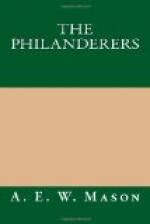‘It looks a bit untidy,’ said Gorley, with a laugh. Two of the troopers approached and laid their hands upon his shoulders. At first he made a movement to shake them off. Then he checked the impulse and stood quietly while they pinioned him. After they had finished he spat on the ground, cast a glance at the square and the rope dangling from a branch above it, and walked easily towards it. The square opened to receive him and closed up again.
On the march back two of the Englishmen sickened of ague and died. Six months later a third was killed in a punitive expedition. The fourth was drowned off Walfisch Bay before another year had elapsed.
CHAPTER I
Hugh Fielding, while speculating upon certain obscure episodes in the history of a life otherwise familiar to an applauding public, and at a loss to understand them, caught eagerly at a simile. Now Fielding came second to none in his scorn for the simile as an explanation, possibly because he was so well acquainted with its convenience. ‘A fairy lamp’ he would describe it, quite conscious of the irony in his method of description, ’effective as an ornament upon a table-cloth, but a poor light to eat your dinner by.’
Nevertheless Fielding hugged this particular simile, applying it as a sort of skeleton key to the problem of Stephen Drake’s career.
He compared Drake’s career, or at all events that portion of it which was closed, to the writing of a book. So many years represent the accumulation of material, a deliberate accumulation; at a certain date the book is begun with a settled design, finis being clearly foreseen from the first word of the preface. But once fairly started the book throws the writer on one side and takes the lead, drags him, panting and protesting, after it, flings him down by-ways out of sight of his main road, tumbles him into people he had no thought of meeting, and finally stops him dead, Heaven knows where—in front of a blank wall, most likely, at the end of a cul de sac. He may sit down then and cry if he likes, but to that point he has come in spite of his intentions.
The actual settling down to the work, with the material duly ticketed at his elbow, in Drake’s case Hugh Fielding dated back to a certain day towards the close of October.
Upon that afternoon the Dunrobin Castle from Cape Town steamed into Plymouth Harbour, and amongst the passengers one man stepped from the tender on to the quay and stood there absolutely alone. No one had gone out to the ship to meet him; no one came forward now on the quay-side, and it was evident from his indifference to the bystanders that he expected no one. The more careless of these would have accounted him a complete stranger to the locality, the more observant an absentee who had just returned, for while his looks expressed isolation, one significant gesture proved familiarity with the environments. As his eyes travelled up the tiers of houses and glanced along towards the Hoe, they paused now and again and rested upon any prominent object as though upon a remembered landmark, and each such recognition he emphasised with a nod of the head.




